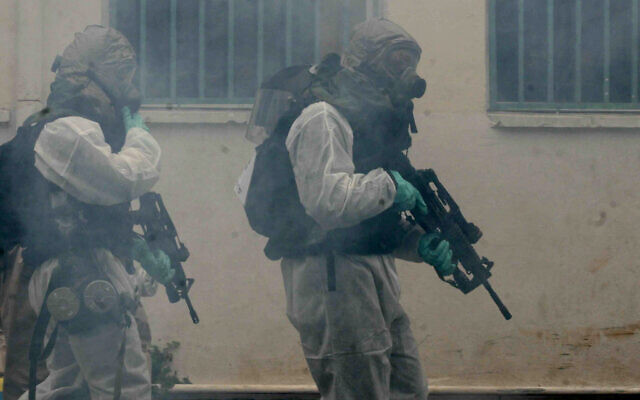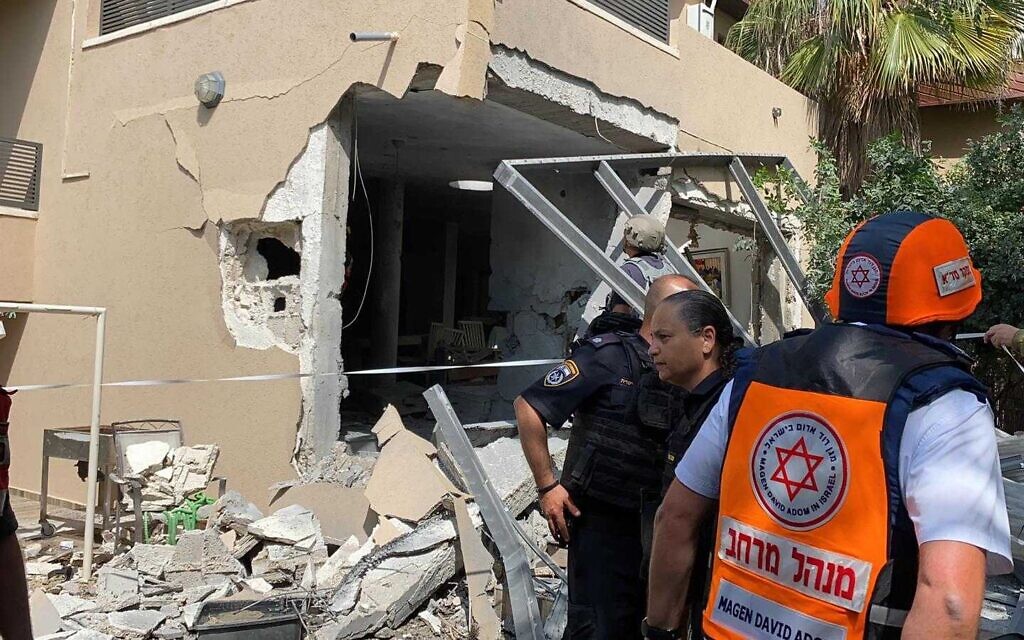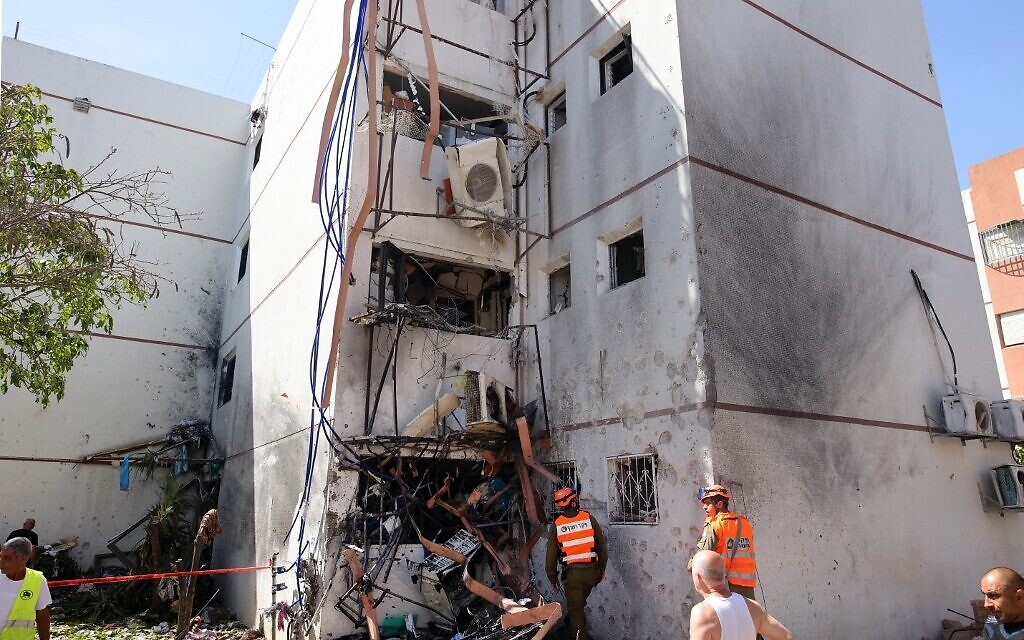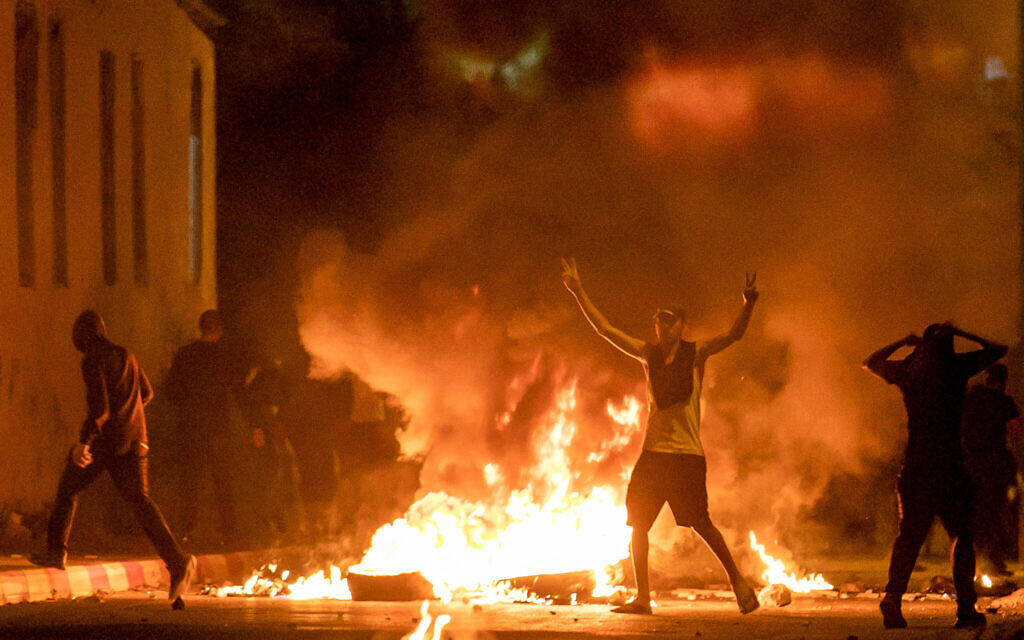Military, Defense Ministry lead week-long national exercise, testing response to massive barrages of rockets, precision missiles, multiple chemical attacks

The Israel Defense Forces and Defense Ministry’s National Emergency Management Authority launched a massive, first of its kind, week-long exercise on Sunday, simulating a full-scale war with Lebanon’s Hezbollah terror group amid a period of domestic turmoil, officials said.
The exercise is meant to see how well Israeli emergency response organizations — namely the military, police, fire department and emergency medical services — learned the lessons from this past May, which saw large amounts of rocket fire toward Israel from Palestinian terror groups in the Gaza Strip. The 11-day conflict, known as Operation Guardian of the Walls, also saw large riots take place in mixed Arab-Jewish cities and towns throughout the country.
“We will test what we learned and experienced at levels I didn’t anticipate in terms of the domestic front,” said Brig. Gen. Itzik Bar, chief of staff of the IDF Home Front Command, speaking to reporters ahead of the exercise.
The exercise, which kicked off on Sunday and was scheduled to last through Thursday, will similarly simulate a major military conflict during a time of internal division, according to Bar.
Unlike in May, when Israel fought Hamas, the drill will simulate a conflict in Lebanon and Syria with the far more powerful Hezbollah, a terrorist army with well over 100,000 rockets and missiles of different ranges, as well as a smaller but still significant quantity of precision-guided missiles, which have emerged as a potentially major issue for Israel. Some military officials have assessed it to be the second most serious threat facing the country, after only an Iranian nuclear weapon.
The exercise will imagine the results of massive rocket and missile barrages at Israel, based on actual Military Intelligence predictions, including chemical weapons attacks, direct hits on toxic chemical storage facilities within Israel, overwhelmed hospitals, and nationwide power outages.
“We have a document that we can refer to about how a multi-front war will look in terms of its scope and significance. So our scenario gives us a degree of accuracy about possible events and how we can direct and refine the exercise so that it can be really effective,” NEMA Director Yoram Laredo told reporters.

“Some aspects that we will be simulating in the exercise: the enemy’s use of disorienting and sedating substances. We will check this out during the exercise, particularly the ability to identify them, with an emphasis on giving clear, focused, life-saving instructions to the civilian population,” he said.
All government offices and emergency services will participate in the exercise, including the Israel Police, Fire and Rescue Services, Magen David Adom ambulance service, and others.
“What concerns me as the chief of staff of the Home Front Command: One is the issue of precision-guided munitions and the effect that they will have on our ability to function and on things in the world of incoming fire alerts. The second is the rate of fire and Hezbollah’s ability to conduct truly massive rocket barrages at specific geographic areas — I’ll use the phrase ‘demolishing the front line’ — directed fire at the communities near the border,” Bar said.
“Another thing: We want to see how they are putting into practice the lessons from Operation Guardian of the Walls. We carried out a very significant learning process with many investigations. This exercise is going to test how those lessons were enacted,” he added.

The IDF Home Front Command’s atomic-biological-chemical unit will simulate responses to both intentional chemical weapons attacks along the border, as well as toxic chemical spills from missiles striking Israeli factories.
Military and civilian personnel will simulate a mass evacuation of northern communities in response to the rocket fire, something that did not happen in May in the south.
Hospitals in northern Israel will also simulate having a massive influx of casualties, requiring patients to be sent to facilities in central Israel by ambulance or by helicopter.
The military will conduct a number of air raid tests, specifically in parts of the country that have recently had changes made to the way they receive incoming alerts. In an effort to make the country’s early warning system more effective, the IDF has split some cities into multiple alert zones, with the alarms sounding only in areas where the estimated impact site was located.
In addition to responding to the attacks from outside of Israel, emergency services will also face discord at home.

“The first day of the exercise will be devoted to the Israel Police, to simulate nationalistic-based riots on many fronts. This will be a day in which the Israel Police can clarify what are the challenges facing it in order to better prepare,” Laredo said.
This will be the first time that National Emergency Management Authority — also known by its Hebrew acronym RAHEL — will jointly lead a national exercise with the IDF Home Front Command.
The NEMA, which was formed in 2007 following the previous year’s Second Lebanon War, was meant to act as an oversight body for the country’s various emergency response organizations, directing them in times of crisis. However, it has in practice been largely ineffectual, in part due to the fact that its power is derived from easily changeable government decisions, rather than a more permanent legislative authority. After its staff and budget were gutted in recent years and in part due to political considerations, the NEMA was largely sidelined during the coronavirus pandemic, playing an inconsequential role during precisely the type of event it was meant to oversee.
As reported by The Times of Israel
